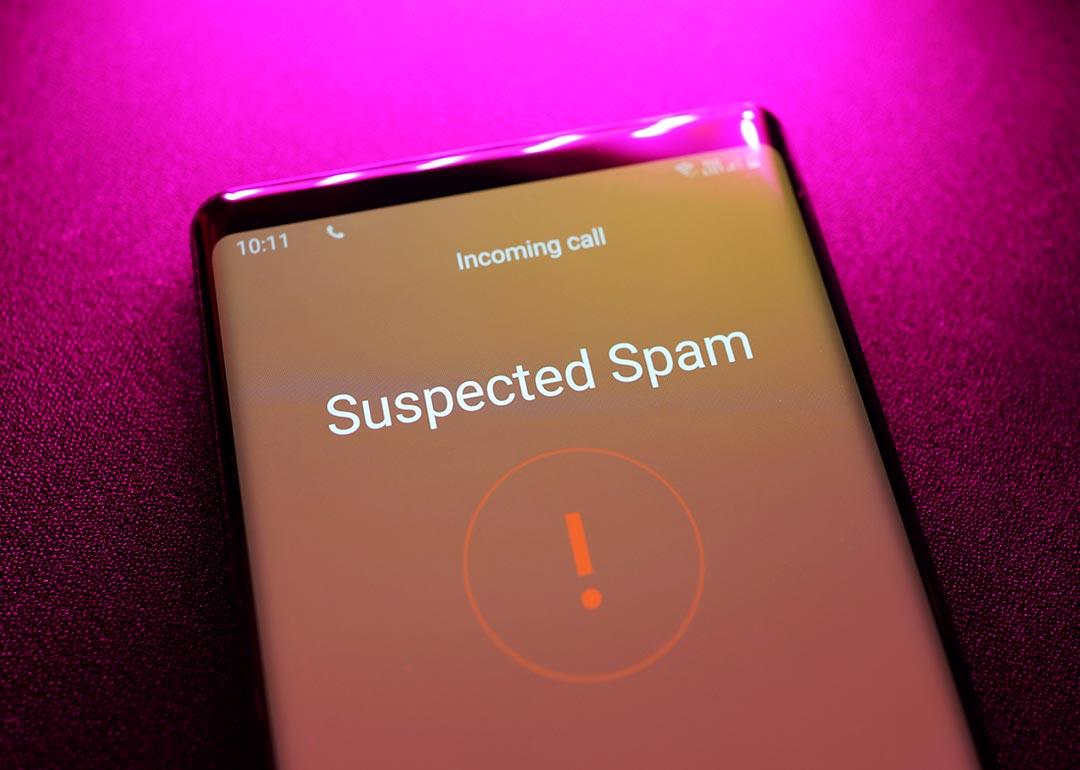
Be on the lookout for these common phone scam area codes
This story was produced by Spokeo and reviewed and distributed by Stacker Media.
Be on the lookout for these common phone scam area codes
These days it can seem as though "spam likely" calls pop up on your phone almost every day. Not only is it incredibly annoying, but it can get in the way of work and life if you're somebody who takes a lot of calls from varying numbers.
While work might force you to pick up calls from unknown numbers or even call them back, there are a few early signs, like common scammer numbers and area codes, that can help you confidently hit decline on those pesky scammers. Spokeo reports on what you need to know.
Common Scammer Area Codes
One of the first things you'll often notice when getting a call from a number you don't recognize is the area code of the caller. This can often be the first clue you're getting a scam call, and more specifically these area codes are most likely to be spam.
Domestic: Be Wary of These Seven Area Codes
- 216 – Cleveland, Ohio
- 218 – Northern Minnesota
- 332 – New York City, New York
- 347 – New York City, New York
- 646 – New York City, New York
- 657 – La Palma, California
- 712 – Western Iowa
These area codes have been found to contain a higher-than-normal scam caller rate. If you don't live near these locations or know people in them, good chance a call from these area codes is a scam. While you're always better off not answering a scam call, hang up immediately should you answer and then realize who you're talking to. And never call back a number you don't recognize!
It's also worth noting that spam calls will often come from numbers very similar to yours (this is called "neighbor spoofing"). It looks familiar so people are more likely to answer, however, you should be extra aware of unknown numbers that are close to your own.
International: Be Wary of These Five Area Codes
- 268 – Antigua and Barbuda
- 649 – Turks and Caicos
- 829 – Dominican Republic
- 868 – Trinidad and Tobago
- 876 – Jamaica
These international area codes are commonly used by scammers due to a simple fact: They have the country code +1 just like the United States. People are already skeptical when answering unknown numbers, and are highly unlikely to answer an international call. So, scammers have found a little workaround by using the above area codes that can look like they're from the US.
Common Phone Scams
Whether it's through general human curiosity or work necessity, a scammer's goal is to get you on the phone. That part is always the same. Once you're on the phone, however, there are a number of phone scams you might find yourself listening to. Here are some of the most common.
The 'One Ring' Phone Scam
This scam works by dialing victims and then quickly hanging up before the call is answered (typically hanging up after one ring, thus the name). They sometimes do this repeatedly, trying to bait people into calling the numbers back.
The scam here is that the number is a premium-rate number owned by the scammers, so, by calling them, you incur a high charge rate, often the second the call goes through.
How to stay safe:
- If you have a bunch of missed calls but no voice messages, good chance they're scam calls.
- If you're suspicious, let the call go through and listen to any voicemail they might leave. If it's legit, you'll be able to tell via the message.
- Look up the number using a reverse phone number lookup tool. This will help identify who is calling, and if the number has been associated with scam or suspicious activity in the past.
The 'Ring and Run' Phone Scam
This scam involves scammers pretending to be a representative of an organization or business with a time-sensitive message for the victim. The fraudsters will often pretend to work for a collection agency, a doctor's office, a bail bondsman, or a number of other charades.
The scam works by the caller immediately going into a compelling story, often about you or a loved one being in some type of urgent trouble. They will then either request money or for you to call back at a specific number that, similar to the "one ring" scam, is a premium-rate number.
How to stay safe:
- If you get a call about a loved one being in trouble, immediately try reaching out to them or other family members to try and verify the claims.
- Never send these callers money, as no actual official service would require doing so.
Is This Phone Number a Scammer?
If you see an incoming or missed call from an unknown number, one of the easiest things to do is look the number up through a reverse phone number lookup tool. By doing this, you'll quickly get access to who's behind the call and have a pretty good idea if the caller is a scammer. And, if the name itself isn't enough, you can also run a name search to get more information, such as age and location, which could tip off information that points to the person being a scammer or not.



